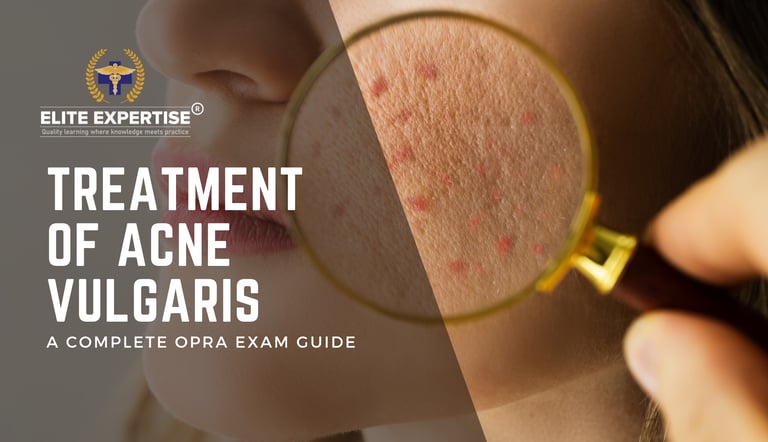ASK MY PHARMACIST | GOT QUESTIONS? Your pharmacist has answers. Click Here
Treatment of Acne Vulgaris: A Complete OPRA Exam Guide
Learn the complete treatment of acne vulgaris with a stepwise approach — topical, oral, and hormonal therapies. Perfect for OPRA exam preparation. Includes key takeaways, FAQs, and pharmacist counselling tips.
Krupa
10/2/20253 min read


Key concepts:
Acne vulgaris, simply known as acne, is a common skin disease seen worldwide.
Commonly, there are three types of acne: mild, moderate, and severe forms of infection.
For Mild Acne: Topical therapy is suggested with a retinoid with or without benzoyl peroxide.
For Moderate Acne: Topical treatment with oral antibiotics is suggested.
For severe acne, oral isotretinoin is recommended only after being suggested by a dermatologist.
Combination therapy used in acne vulgaris prevents antibiotic resistance.
Maintenance therapy is very crucial to avoid recurrences of acne.
For treatment, patient counselling is essential, which will improve adherence, reduce side effects, and help to develop a skin care routine
Worldwide, acne vulgaris is one of the most common skin conditions. Pharmacists being some of the frontline healthcare professionals, it is essential to understand their causes, clinical significance, and treatment plans.
For overseas pharmacists preparing for the OPRA exam, this topic is crucial because it deals with pharmacology, dermatology, and patient counselling skills.
In this guide, we’ll break down the treatment of acne vulgaris, focusing on both pharmacological and non-pharmacological approaches, as well as everything you need to review for the exam.
Understanding Acne Vulgaris
It is an inflammatory skin condition caused by the blockage of pores by dead skin cells or oil (sebum). Common symptoms of acne include:
Blackheads and whiteheads
Pimples, which can be pus-filled and sometimes painful
Oily skin
In cases, scarring happens
It usually affects the face, chest, and back, and is most common in adolescents but can persist into adulthood.
Key Pathophysiology:
It can be caused by increased sebum production (especially in puberty, due to hormonal imbalance).
It can be caused by follicular hyperkeratinisation (clogged pores)
It can also form due to a bacterial infection, caused by Cutibacterium acnes (formerly Propionibacterium acnes)
What are the types of acne?
How severe can acne get?
Dermatologists rank acne as:
Stepwise Treatment of Acne Vulgaris
1. Common Measures to adapt
People with sensitive skin should cleanse their faces with a mild soap twice daily.
Avoid using a scrub or picking the lesions with nails to avoid further infection or scars.
Use mild moisturizers and sunscreens for protection.
2. First-Line Treatment for Mild to Moderate Acne: Topical Therapy
Patients can use topical retinoids (e.g., adapalene, tretinoin), which will reduce nodule formation. It also acts as an anti-inflammatory agent.
Apply topical benzoyl peroxide, which acts as an antibacterial agent that prevents resistance when combined with an antibiotic.
Using topical antibiotics, such as e.g., clindamycin and erythromycin, will reduce bacterial spread. Doctors suggest using it in combination with benzoyl peroxide.
3. Oral Therapy For Moderate to Severe Acne
Oral retinoid derivative: Isotretinoin is an oral retinoid used to shrink the size of oil glands, which contribute to acne formation
Oral antibiotics, such as doxycycline and minocycline, are used to reduce inflammation and further spread.
Some Hormonal Therapy in females, with
Combined Oral Contraceptives (anti-androgenic effect)
Spironolactone (anti-androgen, off-label)
4. Treatment for Severe Acne / Nodulocystic Acne
Oral Isotretinoin (Retinoid): Highly effective, reduces sebum, comedogenesis, and inflammation
This medication should be used with caution. It requires strict monitoring of liver function tests and lipid profiles, and it should be wholly avoided in patients who are pregnant, as it causes teratogenicity.
5. Adjunctive Therapies
Treatment with Intralesional corticosteroids for nodules
Advanced therapy with a light-based source, such as lasers or photodynamic therapy for resistant cases
6. Maintenance Therapy
Patients must continue using topical retinoids, either alone or in combination with benzoyl peroxide, for several months to prevent recurrence.
Conclusion
For pharmacy aspirants preparing for competitive exams like OPRA, it is crucial to understand the topics commonly discussed in the community. Some common skin conditions, like acne vulgaris, are a high-weightage topic for such exams. Pharmacists are the first line of healthcare service providers whom patients rely on for common, mild diseases.
Always consider that patient education and knowledge about standard therapies are essential for a pharmacist. The OPRA exam evaluates the knowledge of a pharmacist to practise in Australia safely and effectively.


About the Author
Krupa Karamchand
Content Writer | Elite Expertise
Krupa Karamchand is a B. Pharm graduate and KAPS-qualified pharmacist with over 7 years of experience in the pharmaceutical field. As an experienced SEO content writer, she combines her in-depth healthcare knowledge with proven digital strategies to create informative, engaging, and search engine–optimized blogs. Krupa is passionate about making complex medical topics easy to understand and accessible to all readers.
Follow On
Follow Us
+91 76750 84909
Privacy Policy | © 2025 Elite Expertise . All Rights Reserved.
ELITE EXPERTISE PTY. LTD (ABN: 15668292439) (ACN: 668292439)
Australian Statutory Education License: OPP 2025 ELITE EXPERTISE PTY. LTD
Disclaimer
Elite Expertise is an online education platform dedicated solely to providing coaching and preparation services for the OPRA, PEBC, PSI and PTE exams. We do not offer any sponsorship or migration services. All information provided on our platform is for educational purposes only and should not be interpreted as legal or immigration advice. For inquiries regarding sponsorship, visa applications, or migration services, please consult with licensed immigration professionals or relevant authorities.
Elite Expertise is a trusted and results-driven training platform specializing in preparation for international pharmacist licensing exams. Our comprehensive courses, expert instructors, and proven methodologies have helped countless pharmacy professionals achieve their goals and succeed in competitive regulatory exams. We are proud of our strong success rate and commitment to excellence.
Elite Expertise is an independent training provider. We are not affiliated with any global pharmacy regulatory authorities or official exam-conducting bodies.
Copyright © 2026 Elite Expertise. All rights reserved.
Address
Unit 1/73 Beverley St, Doncaster East VIC 3109, Australia
